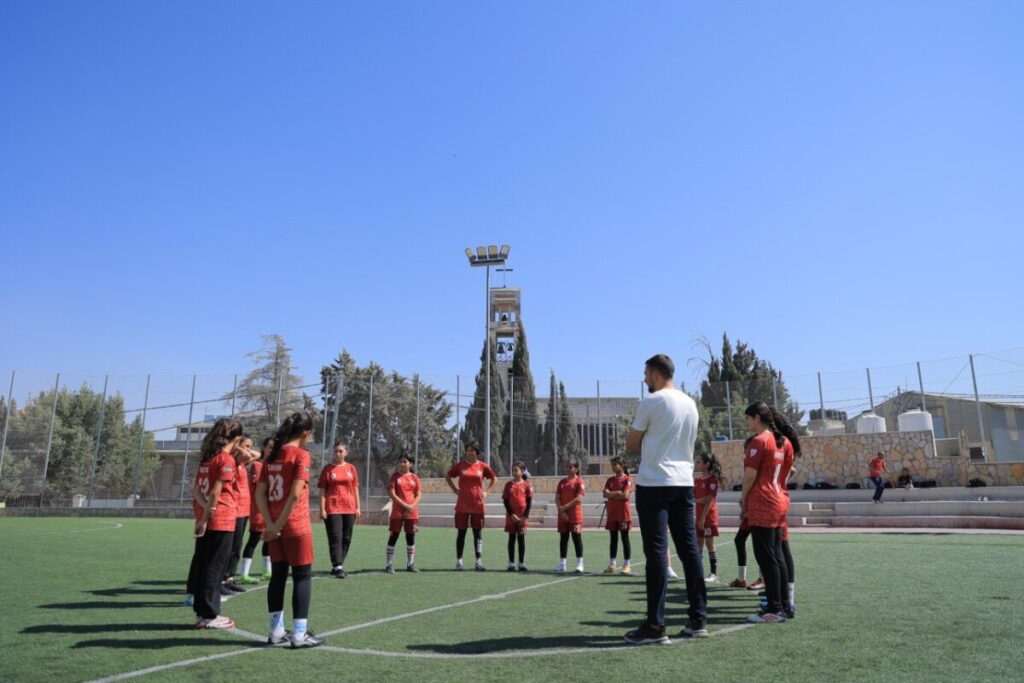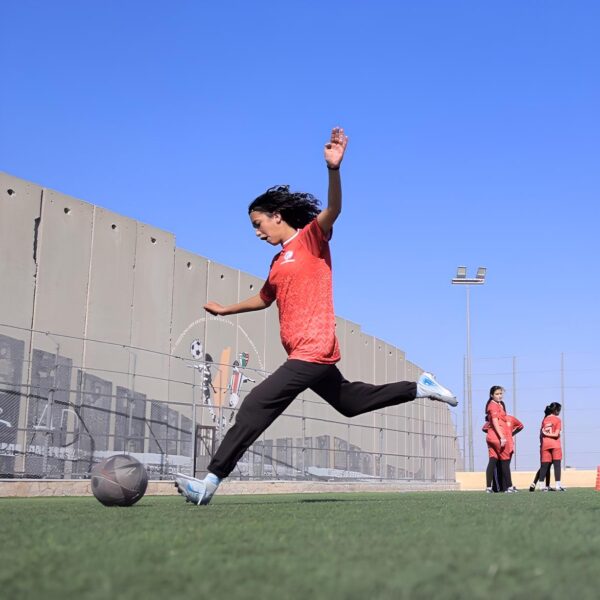In a society where football is often seen as an activity reserved for men, young Palestinian women who wish to play this sport face numerous obstacles, from entrenched social norms to a lack of institutional support. When it comes to women, sports, and particularly football, remain underfunded and neglected in favor of men's teams.
But in the Aida refugee camp, north of Bethlehem, a small but determined revolution has taken root. In 2021, the Aida Youth Center - a former sports, cultural, and social center affiliated with UNRWA, now managed by local youth due to UN budget cuts - made the bold decision to form a women's football team. It has since evolved to become one of the most prominent in the refugee camps of the West Bank, with several players now making up the Palestinian women's national team.
Fighting Against Traditions and Preconceptions
“It was not an easy decision,” explains Munther Amira, head of the Aida Youth Center and a leading human rights activist. “We faced immense challenges, primarily social traditions that reject the idea of girls playing football. But we believed in women's right to fully participate in life, and the team was born from that conviction.”
To develop the project, the center held meetings with women's organizations and social institutions. The discussions revealed a strong desire to play football among many girls in the camp. It was, according to Amira, the moment of clarity: the center had to act.
The path forward was not without financial obstacles. Even the men's team lacked funding. However, thanks to twinning relationships between the Aida camp and several French cities, the women's team secured the necessary resources.
Since its inception, the team, under the joint efforts of the Aida Youth Club and the Udd Sports Union, has grown to include more than 40 players. It participates in friendly tournaments throughout the Bethlehem governorate, against teams like Beit Sahour and Al-Ubeidiya.
A Fighter's Journey
Amira attributes the success to the unwavering belief that women's participation concerns all areas, especially in refugee camps that rarely offer such opportunities. “It was the first women's football team in the Aida camp, and perhaps in all Palestinian refugee camps,” he states.
The team, made up of girls aged 13 to 20, trains regularly on a small field near the Israeli separation wall. It is a symbol of the dual challenges they face: being Palestinians under occupation and women in a conservative society.
Sports coordinator Mohannad Abu Srour emphasizes the remarkable evolution of the team. “After four years of effort, three players joined the national team and represented Palestine in 2024 at the West Asian Girls' Football Championship in Saudi Arabia.”
However, the beginnings were not easy. “Many families initially resisted, due to social taboos around girls playing football,” regrets Abu Srour. “But daily work and constant communication with parents helped build trust. Now, we have a committed and stable team. And growing community support.”
Between Friendly Matches
According to Roweida Al-Azzeh, one of the first players of the team who has become its coach, the idea arose from the realization that many young women in the camp wanted to play. “Fortunately, the Aida Club and the Udd Union created this space. Now, we see girls of all ages playing football and participating in local tournaments.”
The team has participated in several friendly matches as well as a cultural exchange program in France, where the players were able to take part in sports activities. Upon their return, three players were selected to join the national team.
Al-Azzeh recalls that the team's beginnings were anything but conventional. “But hard work and talent broke stereotypes. We proved that women can excel in football just like men.” And she concludes with a message for all girls in the world: “Chase your dreams. Neither occupation nor social pressures can stop you. Determination makes the impossible possible.”
The players themselves have expressed their pride in the evolution of the team. For Nour Abu Ghuneim, a player from Udd, now a member of the national team, joining the team changed her life. “I have loved football since childhood, but as a girl, I was not allowed to play, while my brothers did. When the team was formed, it felt like an impossible dream.”
And Ambitious Goals
Nour quickly joined the team and impressed the coaching staff during the first training sessions. Her performances in local matches caught the attention of the national coach of Palestine, who selected her for the team. “Without the Udd women's team, I would not be where I am today.”
Now, she trains with the national team in Jericho twice a week, preparing for international tournaments. “It’s a dream come true, the Udd team has broken harmful social rules, and has given me this chance.”
Regarding the future, the leaders of the Udd Club have ambitious goals. The team is forging international partnerships, including with French clubs from sister cities or famous clubs like Deportivo Palestino in Chile. The message is clear: no political or social obstacle will stand in the way of the Udd women's - and men's - teams.

Featured photo: The team trains regularly on a small field near the Israeli separation wall © Monjed Jadou
